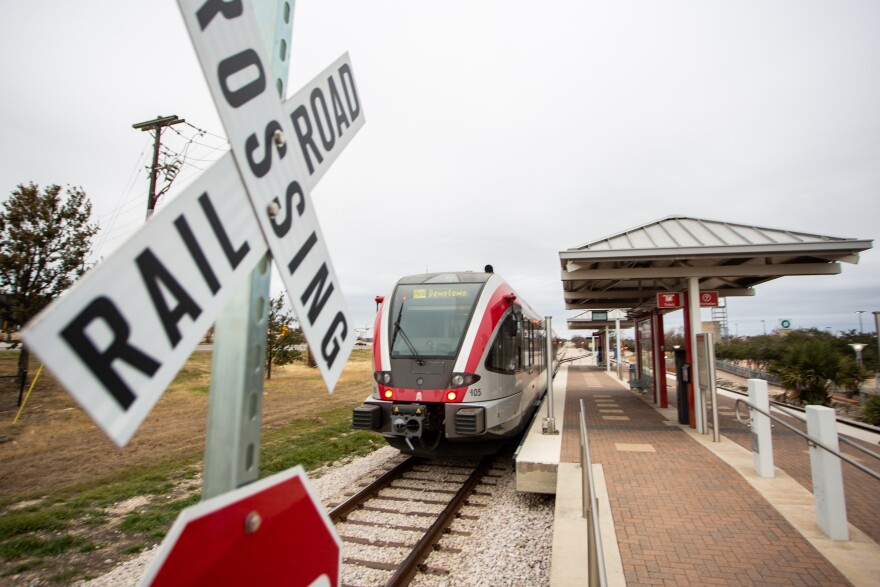Voters in Leander will decide this month whether to end Capital Metro services in the city. Early voting is underway for the May 7 election.
Capital Metro provides a MetroExpress commuter bus route into downtown Austin, the local on-demand transit option Pickup and a commuter rail link into Austin. It's paid for with a 1% sales tax.
The sales tax has been generating increasingly more money as Leander's economy booms, while transit ridership has slumped during the pandemic. The diverging trend lines have created a perfect storm for CapMetro opponents who have fought unsuccessfully for years to remove Leander from the service area.
Proposition A asks voters if CapMetro should continue in Leander. Supporters say the transit service is vital to one of the fastest-growing cities in the country. They point to millions of dollars in infrastructure funding CapMetro is offering and the prospect of being connected to a multibillion-dollar light-rail system — built at the expense of Austin taxpayers — that will connect Leander with Austin-Bergstrom International Airport.
"A yes vote on Proposition A in Leander honors our promise to seniors, to people with disabilities, to parents and students," said James Larsen with Keep Leander Connected, a group organized to support Proposition A. "Unfortunately, a no vote will leave them stranded."
Opponents of Proposition A say Leander's transit offerings are not used enough to justify spending surging sales tax revenues as the city's population skyrockets.
Leander's CapMetro sales tax drew in $9.8 million in 2021. This year, the city's sales tax revenue is up by 28% compared with the same point in 2021, data from the Texas Comptroller shows.
Meanwhile, ridership on the three CapMetro services in Leander fell from around 635 average daily boardings in 2019 to about 130 in the fall of 2021, according to a consultant's report commissioned by the Leander City Council.
CapMetro ridership has increased in recent months, with commuter rail use almost doubling from February to March. But transit use hasn't yet bounced back to pre-pandemic levels.
"It's an incredible waste of money," said Mike Sanders, a Leander resident pushing to terminate the city's contract with CapMetro. "We need to take that $10 million and use it for the economic development of our city."
The second question on the May 7 ballot addresses what would happen with the tax revenue left over if Leander were to end its relationship with CapMetro. Proposition B asks voters if the 1% sales tax should be diverted to the city's general fund or ended. The City of Leander already has a 1% sales tax on top of the state's 6.25% levy. The maximum sales tax in Texas is 8.25%.
Regardless the outcome of Proposition B, if Leander voters opt to leave CapMetro's service area, they'd be on the hook for financial penalties, outlined in state law, that include Leander's share of CapMetro debts and other financial obligations.
That payoff amount, as of Dec. 31, was estimated to be $42.3 million, according to the City of Leander. The 1% sales tax would be collected and the revenue sent to CapMetro until the obligations were paid off.
The day before Leander's City Council voted to schedule this election, Capital Metro's board tried to sweeten the city's deal by offering almost $2 million in infrastructure funding this year and most of the money from a new $10 million infrastructure fund created in January. If Leander stays in CapMetro, the deal would return millions of dollars to the city each year for streets, sidewalks, traffic signals and other infrastructure — as long as the spending prioritizes public transit.
This is not the first time Capital Metro has been on the ballot in Leander. After the city voted to join the transit agency in 1985, an attempt to cut ties with CapMetro failed in 2000. Leander voters went on to approve rail service in 2004.
As of Monday afternoon, turnout in the current election in Leander was 6.15%, with 31,960 votes cast, according to data posted by the Williamson County Elections Administration.
Tuesday is the last day of early voting, and Election Day is Saturday.












